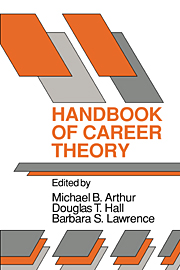Book contents
- Frontmatter
- Contents
- List of contributors
- Preface
- PART I CURRENT APPROACHES TO THE STUDY OF CAREERS
- Introduction to Part I
- 1 Generating new directions in career theory: the case for a transdisciplinary approach
- 2 Trait-factor theories: traditional cornerstone of career theory
- 3 Careers, identities, and institutions: the legacy of the Chicago School of Sociology
- 4 The utility of adult development theory in understanding career adjustment process
- 5 Developmental views of careers in organizations
- 6 Exploring women's development: implications for career theory, practice, and research
- 7 The influence of race on career dynamics: theory and research on minority career experiences
- 8 Asynchronism in dual-career and family linkages
- 9 Transitions, work histories, and careers
- 10 Career system profiles and strategic staffing
- PART II NEW IDEAS FOR THE STUDY OF CAREERS
- PART III FUTURE DIRECTIONS FOR THE DEVELOPMENT OF CAREER THEORY
- Name index
- Subject index
4 - The utility of adult development theory in understanding career adjustment process
Published online by Cambridge University Press: 05 June 2012
- Frontmatter
- Contents
- List of contributors
- Preface
- PART I CURRENT APPROACHES TO THE STUDY OF CAREERS
- Introduction to Part I
- 1 Generating new directions in career theory: the case for a transdisciplinary approach
- 2 Trait-factor theories: traditional cornerstone of career theory
- 3 Careers, identities, and institutions: the legacy of the Chicago School of Sociology
- 4 The utility of adult development theory in understanding career adjustment process
- 5 Developmental views of careers in organizations
- 6 Exploring women's development: implications for career theory, practice, and research
- 7 The influence of race on career dynamics: theory and research on minority career experiences
- 8 Asynchronism in dual-career and family linkages
- 9 Transitions, work histories, and careers
- 10 Career system profiles and strategic staffing
- PART II NEW IDEAS FOR THE STUDY OF CAREERS
- PART III FUTURE DIRECTIONS FOR THE DEVELOPMENT OF CAREER THEORY
- Name index
- Subject index
Summary
This chapter examines contemporary adult development theory, particularly as it relates to the theory of careers. It presents a case that to more fully understand the processes of career development, one must attend to the dynamics of life course development and adjustment. Thus, we intend to show the benefit of adding the adult development approach to career theory to help reconcile otherwise contradictory findings in the career literature. To illustrate this point, we start with a comprehensive model of career adjustment that integrates adult development concepts with career dynamics. We then move to a review and critical analysis of the current adult development literature.
A MODEL OF CAREER ADJUSTMENT
In a previous paper, Crites (1976) formulated a comprehensive model of career adjustment in which the dynamics of how workers cope with frustrating conditions on the job were delineated. Briefly, Crites viewed the process of career adjustment as one that includes (1) work motives, (2) conflict and frustration, (3) adjustment mechanisms, and (4) job satisfaction and success. Career adjustment was described against a contextual background of such factors as the general cultural and society milieu, organizational climate, psychological dispositions and characteristics, and personal and demographic attributes. Crites assumed that the career adjustment process is developmental but did not articulate how it is projected over time. He developed the model only for early adulthood and did not consider middle and later life stages in the work life. Moreover, a fundamental problem concerning the outcomes of the career adjustment process was not examined: Why is it that two of the most critical and apparently complementary components of career adjustment process is developmental but did not articulate how it is projected over time.
- Type
- Chapter
- Information
- Handbook of Career Theory , pp. 66 - 88Publisher: Cambridge University PressPrint publication year: 1989
- 18
- Cited by



